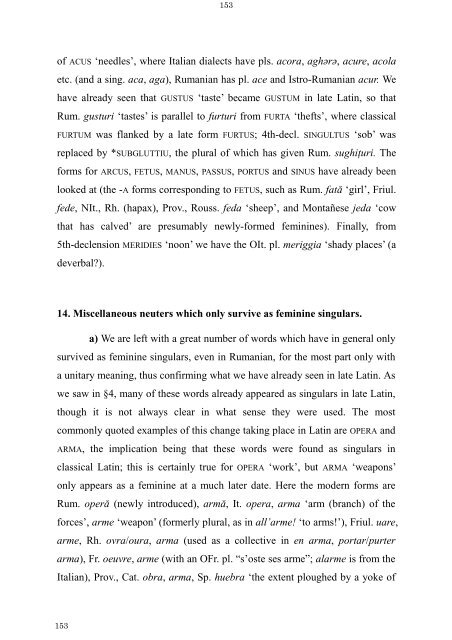The Latin Neuter Plurals in Romance - Page ON
The Latin Neuter Plurals in Romance - Page ON
The Latin Neuter Plurals in Romance - Page ON
Create successful ePaper yourself
Turn your PDF publications into a flip-book with our unique Google optimized e-Paper software.
153<br />
153<br />
of ACUS ‘needles’, where Italian dialects have pls. acora, aghərə, acure, acola<br />
etc. (and a s<strong>in</strong>g. aca, aga), Rumanian has pl. ace and Istro-Rumanian acur. We<br />
have already seen that GUSTUS ‘taste’ became GUSTUM <strong>in</strong> late <strong>Lat<strong>in</strong></strong>, so that<br />
Rum. gusturi ‘tastes’ is parallel to furturi from FURTA ‘thefts’, where classical<br />
FURTUM was flanked by a late form FURTUS; 4th-decl. SINGULTUS ‘sob’ was<br />
replaced by *SUBGLUTTIU, the plural of which has given Rum. sughiŃuri. <strong>The</strong><br />
forms for ARCUS, FETUS, MANUS, PASSUS, PORTUS and SINUS have already been<br />
looked at (the -A forms correspond<strong>in</strong>g to FETUS, such as Rum. fată ‘girl’, Friul.<br />
fede, NIt., Rh. (hapax), Prov., Rouss. feda ‘sheep’, and Montañese jeda ‘cow<br />
that has calved’ are presumably newly-formed fem<strong>in</strong><strong>in</strong>es). F<strong>in</strong>ally, from<br />
5th-declension MERIDIES ‘noon’ we have the OIt. pl. meriggia ‘shady places’ (a<br />
deverbal?).<br />
14. Miscellaneous neuters which only survive as fem<strong>in</strong><strong>in</strong>e s<strong>in</strong>gulars.<br />
a) We are left with a great number of words which have <strong>in</strong> general only<br />
survived as fem<strong>in</strong><strong>in</strong>e s<strong>in</strong>gulars, even <strong>in</strong> Rumanian, for the most part only with<br />
a unitary mean<strong>in</strong>g, thus confirm<strong>in</strong>g what we have already seen <strong>in</strong> late <strong>Lat<strong>in</strong></strong>. As<br />
we saw <strong>in</strong> §4, many of these words already appeared as s<strong>in</strong>gulars <strong>in</strong> late <strong>Lat<strong>in</strong></strong>,<br />
though it is not always clear <strong>in</strong> what sense they were used. <strong>The</strong> most<br />
commonly quoted examples of this change tak<strong>in</strong>g place <strong>in</strong> <strong>Lat<strong>in</strong></strong> are OPERA and<br />
ARMA, the implication be<strong>in</strong>g that these words were found as s<strong>in</strong>gulars <strong>in</strong><br />
classical <strong>Lat<strong>in</strong></strong>; this is certa<strong>in</strong>ly true for OPERA ‘work’, but ARMA ‘weapons’<br />
only appears as a fem<strong>in</strong><strong>in</strong>e at a much later date. Here the modern forms are<br />
Rum. operă (newly <strong>in</strong>troduced), armă, It. opera, arma ‘arm (branch) of the<br />
forces’, arme ‘weapon’ (formerly plural, as <strong>in</strong> all’arme! ‘to arms!’), Friul. uare,<br />
arme, Rh. ovra/oura, arma (used as a collective <strong>in</strong> en arma, portar/purter<br />
arma), Fr. oeuvre, arme (with an OFr. pl. “s’oste ses arme”; alarme is from the<br />
Italian), Prov., Cat. obra, arma, Sp. huebra ‘the extent ploughed by a yoke of









